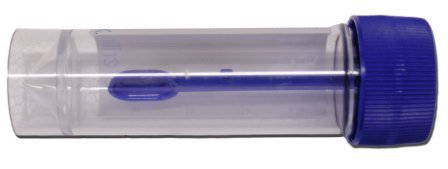Faecal Elastase
Chemical Pathology
Notes
The enzyme pancreatic elastase-1 (E1) is secreted by the acinar cells of the pancreas and acts to break down collagen. This enzyme is not degraded on transit through the gut so acts as a good marker of pancreatic exocrine function when measured in faecal samples.
The test is appropriate for investigation of suspected pancreatic exocrine insufficiency, causes of which include, chronic pancreatitis, cystic fibrosis, diabetes mellitus, cholelithiasis (gallstones), ‘pancreatic cancer and papillary stenosis.
Sample requirements
A minimum of 1g (cherry sized) stool sample in a stool collection pot

NOTE: Samples grossly contaminated with blood and/or a lot of fibrous matter, hard stools, mucous samples, neonatal samples and watery stool samples are unsuitable for analysis.
Storage/transport
Send at ambient temperature to the laboratory. If unavoidable samples can be stored refrigerated overnight but must be received within 3 days of collection.
Required information
Relevant clinical details including the reason for the test.
Turnaround times
Stool samples are sent for analysis to King's College Hospital, London. Results are expected back within 4 weeks.
Reference ranges
Normal: 200 - >500 µg E1/g faeces
Moderate to mild exocrine pancreatic insufficiency: 100 – 200 µg E1/g faeces
Severe exocrine pancreatic insufficiency: <100 µg E1/g faeces.
Further information
The assay used is highly specific for human pancreatic E1 and patients do not need to stop taking pancreatic supplements before assessment of pancreatic exocrine function.
For more information access article ADC Education and Practice 2010 "How to Use Faecal Elastase"
Page last updated 24/05/2024